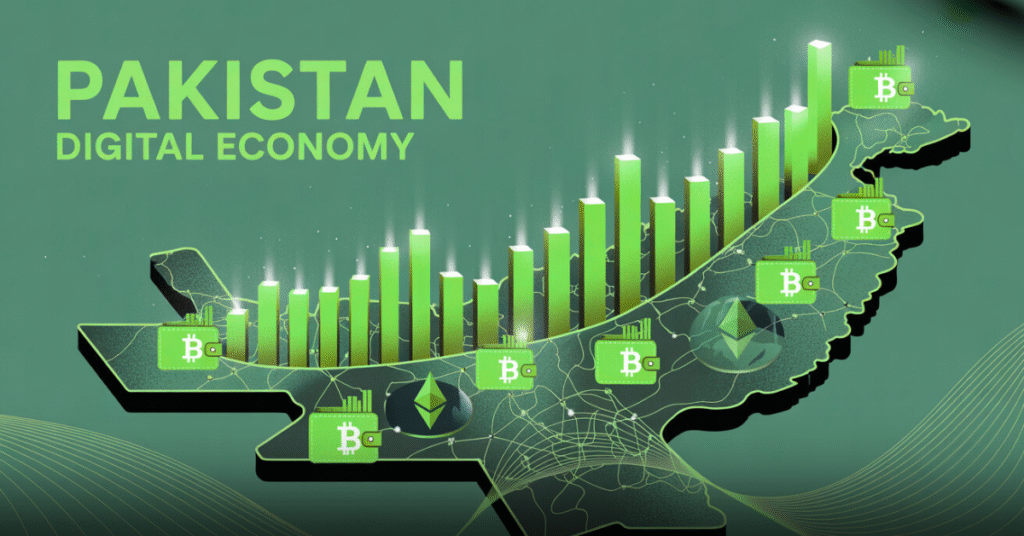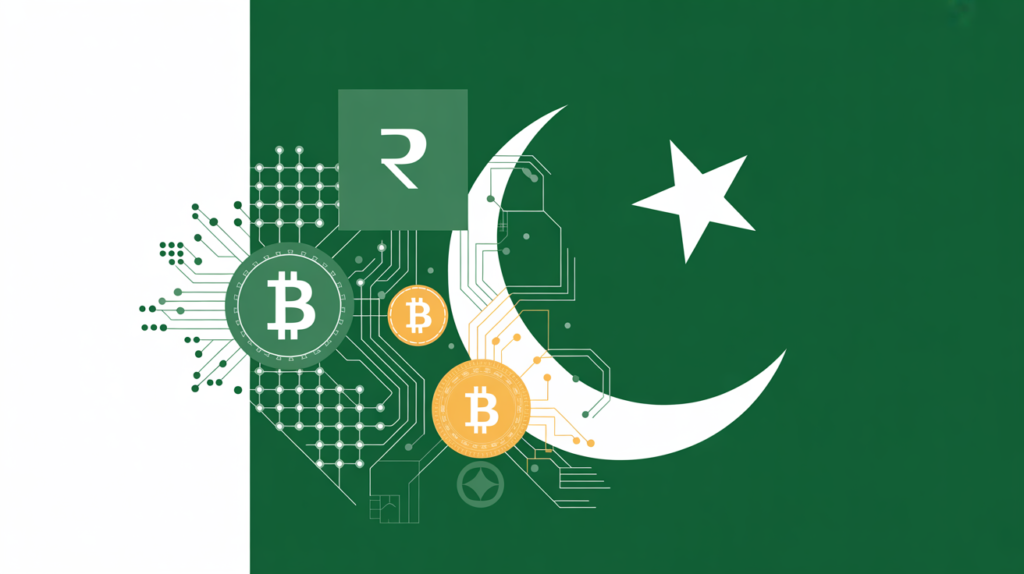
The economy of Pakistan is encountering profound challenges in the context of rising inflation, the depreciation of the rupee, and mounting external debt. Yet the Afghanistan border is witnessing the spread of cryptocurrency. The State Bank of Pakistan (SBP), surprisingly, and after many years of deafening legal silence, has begun to show signs of withdrawing its previous advisories declaring cryptocurrency illegal. This is a watershed moment regarding Pakistan crypto legalization. And the strategy is not only about opacity unblocked for ‘bits and bytes. And by the middle of the next decade, understanding crypto in Pakistan 2025 would be pivotal for international financiers, decision makers, and even the common people.
From Ban to Pakistan Crypto Legalization Process– What Changed?
The recent legalization of cryptocurrency in Pakistan was a result of many years of reversals and circumventions. The first move by the country to determine the boundaries of the digital financial world was in 2018, with the issuance of the ‘cryptocurrency is illegal’ policy. The regulatory body, in this case, and the State Bank of Pakistan issued dire advisories warning the citizenry of the consequences of entering the digital financial space. This adversary was not the only crypto-limiting context in the year 2023 – the recurring, and even cyclic, projections of value and exchange synthesis of the ‘decentralized economy’ were roughed over, and optimistic thoughts abound.
Neutralizing the cryptocurrency ban by the State Bank of Pakistan and the rapid rise of cryptocurrency use in the hands of local citizens paved the way for new policies regarding cryptocurrency in Pakistan.
The imminent requirements concerning the Financial Action Task Force, as well as the surging global crypto acceptance, have created the need for regulation frameworks, rather than imposing bans on the citizens of the country.
The decision, as well, appears to be on the basis of economic reasoning. The government would have lost the ability to regulate and generate revenue from taxation if crypto were to be completely banned.
Pakistan’s Plan for a Central Bank Digital Currency (CBDC)
The digital rupee, along with other policies as central to the digital strategy of the country, would then be the foremost attempt at digital currency of Pakistan. The currency aims to provide a form of currency that is traceable and regulated.
Compared to cash and uncontrolled cryptocurrencies, the digital rupee has major benefits. Expanded traceability, for instance, is likely to simplify financial laundering and tax evasion while new security features mitigate counterfeiting and fraud. Most importantly, the increased availability and access to a CBDC can provide a legal substitute for transactions that use crypto to eliminate the reliance on gray markets.
The CBDC for Pakistan is a pivotal element in the fostering of a connected digital ecosystem. The digital rupee will supplement the bank with new features for financial services, cross-border transactions, and distribution of government benefits. This will place Pakistan in a growing list of nations considering issuing digital sovereign currencies to enhance economic growth.
As the country tries to tap into the unbanked population, the increased availability and proliferation of smartphones make the timing of a digital financial services leap a strategic one.

New Regulatory Framework for the Virtual Assets Bill 2025
At the crux of Pakistan crypto legalization initiative is the robust Virtual Assets Bill, which prescribes a legal framework for the undertaking of digital activities. The government creates the Pakistan Virtual Assets Regulatory Authority, which is responsible for licensing of virtual assets operations and secure transactions.
PVARA will also supervise the exchange-related and anti-money laundering activities, as well as consumer and market protection. The authority can start and prosecute investigations into violations, penalties, and punishment, and cooperate with foreign regulators about cross-border criminal accusations in crypto.
In contrast, the cryptocurrency regulations in Pakistan encounter several significant caveats. Cryptocurrencies will not have the status of legal tender, and thus cannot replace the Pakistani Rupee in official transactions. The framework still protects the Rupee’s primary role while restricting the use of crypto to investment, trading, and certain business activities at that time.
This approach enables Pakistan to get the advantages of crypto while also upholding its autonomy over policy. The framework balances cross-border compliance with international standards while leaving room for proactive policy in regulation and investment for the digital asset ecosystem.
The Statistics of Pakistan Investments in Crypto
Pakistani crypto wallets have reportedly exceeded more than 40 million users as the country sits third in crypto adoption, just behind the USA and India. This is a remarkable feat for Pakistan, but roughly $21 billion has already been invested in digital assets, which shows how much demand there is in the market.
Cryptocurrency and Bitcoin mining in Pakistan impress the government, and all eyes are on this topic. The country has a surplus capacity of generation, especially with renewables, which makes it lucrative for Bitcoin mining. This capability has the potential to generate foreign investment and technology, contributing to exports.
The government understands the attraction of foreign direct investment and potential cryptocurrency tax revenue. Crypto operations with clear regulations could formalize previously unmonitored activities worth billions, thus enhancing the tax revenue. Moreover, the lack of a clear regulatory framework may drive away foreign cryptocurrency firms looking for jurisdictions with favorable operating conditions.
Pakistan’s population which is young, enthusiastic about technology, and is well-suited for the adoption of cryptocurrency. The level of smartphone ownership, coupled with the ease of access to the Internet and the growing use of digital payment systems, makes the country a potential market for cryptocurrency.

Key Players Driving the Shift
Th e Bilal Bin Saqib crypto initiatives have greatly contributed to the transformation of the country. While serving as the Republic of Pakistan Minister of Blockchain and Cryptocurrency, Saqib, as of today, has supported the addition of regulations to the country as long as Pakistan remains FATF compliant. He has also supported cryptocurrency mining and government use of blockchain initiatives –
Saqib’s Pakistan initiatives, along with attracting global mining entities, constructing borderless governance platforms, and fostering an enabling environment for crypto entrepreneurs and startups, aim to position Pakistan at the core of the region’s cryptocurrency landscape.
These efforts, especially the crypto partnerships with World Liberty Financial, a Trump-linked enterprise, have generated positive publicity for Pakistan and crypto partnerships internationally.
The policies of the government encourage the exploitation of crypto through the fulfillment of international obligations to global crypto regulatory frameworks and cryptocurrency compliance, as well as the regulatory obligations to keep the finances of the nation.
The Supporters and Critics of Crypto Pakistan Gone Wild
The discussion regarding cryptocurrency in Pakistan centers on both its supporters and detractors. Advocates of crypto SMEs believe the local ecosystem will flourish through investment in the economy. It will also assist in decreasing the economic competitiveness of Pakistan in the world.
One of the benefits mentioned by supporters of crypto is the ability for these services to be rendered at a lower cost and to a larger portion of the population, especially the unbanked.
Involving military institutions, operational absences of accountability, and financial crypto within Pakistan involving the currency/exchange ratio, all raise critical issues of currency capital flight and crypto operations, as the Pakistan crypto criticism suggests.
According to Habib Lahan: In Pakistani ecosystem, cryptocurrency is a tool for financial innovation.
However, due to the inadequacies in regulation processes, as well as in multi-layered bureaucracy, more reservations tend to be raised. These belong to Pakistan’s worries condition the majority of its colleagues
On the other hand, the boxer regulatory environment.

What This Means for Pakistani Investors
Improving regulations, a trader within a particular perimeter, should make crypto trading in Pakistan safer, more transparent, and easily accessible. This, in turn, should encourage a more competitive market in crypto trading in Pakistan.
Also, the newly leveled regulatory certainty should even encourage more traditional, trusted financial institutions to invest in Pakistan in cryptocurrency.
Still, some risks continue to exist. Still, cryptocurrency markets are too unpredictable, guidelines could change at any time, and overseas obligations could affect access to trade. Fresh investors must stay up to date with rules and regulations, operate through legal, licensed platforms, be aware of their risks, and most importantly, only invest what they can not make a problem in their life in case of loss, because it’s too difficult to control their minds.
Conclusion: The Way Forward for Pakistan in Crypto
At that point, Pakistan is in a critical time period in its cryptocurrency journey. The change from a ban to a Pakistan crypto legalization is stunning decision. Regulated platform may create opportunities for new economic investments from abroad. However, the outcome could also be disastrous in the form of negative financial stability and poor international relations, especially if the change is executed poorly.
The country is one of the most well-positioned nations in the world for crypto adoption, with Pakistan having significant market adoption, a strong tech workforce, plenty of energy, and most importantly, support from the government.
The success of this transition will mean that cryptocurrency becomes a savior to the crumbling Pakistani economy or an extra liability. However, the rewards of getting this transformation are absolutely right.
Summery
Pakistan is undergoing a radical change where it is replacing the ban on cryptocurrencies and Pakistan crypto legalization process start very quickly. The State Bank of Pakistan will remove past warnings labeling crypto illegal, and this will permit the Virtual Assets Bill 2025 and the creation of the Pakistan Virtual Assets Regulatory Authority (PVARA).
The main trends include the introduction of a digital rupee CBDC, the regulation of cryptocurrency exchanges, and governmental backing led by Minister Bilal Bin Saqib. According to 2025 reports, over 40 million crypto wallets and an investment totaling $21 billion from Pakistan in crypto, which is more than the Pakistan Stock Market, which is why Pakistan ranks in the world for cryptocurrency adoption at 3rd position in 2025.
Whilst its proponents view prospects of economic growth, influx of investment, and access to finance, opponents fear the risk of capital flight and difficulties in implementation. The new system will not make cryptocurrencies the legal tender, and the rupee will remain primary, but regulated trading and investment via licensed exchanges can be conducted under the supervision of PVARA.
Table of Content
Table of Contents
ToggleAbout Company
pakcryptoinfo is a team of crypto enthusiasts, traders on a mission to simplify digital currency for everyone. We are dedicated to providing innovative solutions tailored to your needs. With a focus on quality and customer satisfaction, our team works tirelessly to ensure your experience with us is seamless and rewarding.
Most Recent Posts
- All Posts
- Crypto and Islam
- Crypto News
- Featured Personalities
- Pak Crypto News
- PakCryptoInfo Blogs
Follow on Social Media
Buy Crypto
If your are beginner and want to start your journey in crypto also want to get the basic guide we can help you to start your crypto journey in buying crypto and many more.
We can Help to Promote your Business
FAQs
Pakistan is indeed headed towards the legalization of crypto. In order to replace the old advisories stating that crypto is illegal, the State Bank of Pakistan intends to issue detailed regulations as described in the Virtual Assets Bill 2025.
After the new regulatory framework is introduced, all Pakistanis will be able to purchase Bitcoin and other cryptocurrencies legally by using licensed exchanges that are controlled by the Pakistan Virtual Assets Regulatory Authority (PVARA).
Pakistan has a planned State Bank of Pakistan to create the Pakistani digital currency that may be supported by the Central Bank. It will offer a controlled form of digital payment, with better traceability and security.
No, at that point it looks impossible, but maybe in the future. Specifically, the regulatory framework does not allow crypto to gain legal tender status and have the Pakistani rupee designated as the major currency in which official transactions occur.
Pakistan Virtual Assets Bill 2025 is in the process of development and should be implemented during 2025. Certain timeframes will be contingent on legislative ratification and the development of regulatory infrastructural provisions.




 Bitcoin
Bitcoin  Ethereum
Ethereum  Tether
Tether  XRP
XRP  USDC
USDC  TRON
TRON  Lido Staked Ether
Lido Staked Ether  Dogecoin
Dogecoin  Cardano
Cardano